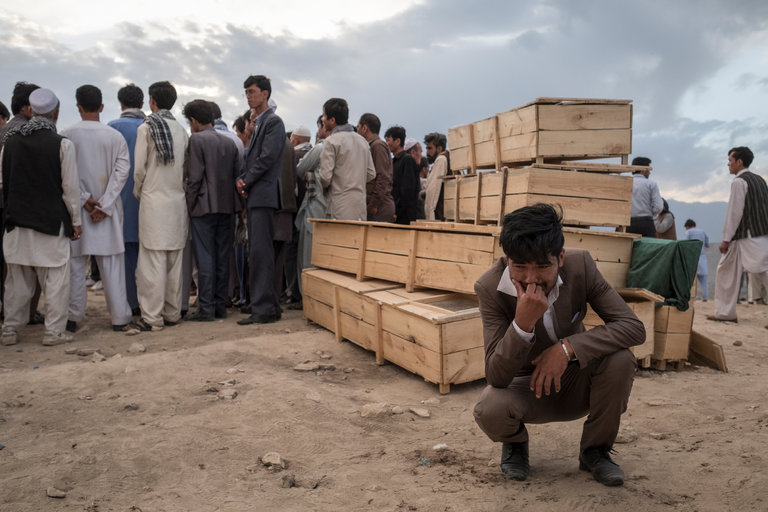One after another, the bodies arrived on the steep hill in western Kabul.
For much of Sunday afternoon, an excavator was flattening the dusty area as men with shovels and pickaxes dug graves — four rows of 20 or so, packed so close that if the dead could stretch out their arms, they would touch those next to them.
The ethnic Hazara man cries next to empty caskets on Sunday during burial ceremonies at a cemetery in the Omid-e-Sabz Township near Kabul, Afghanistan. Credit Adam Ferguson for The New York Times
In the hours that followed, nearly two dozen of the at least 80 protesters killed in a bombing claimed by the Islamic State on Saturday were buried here, in overlapping ceremonies that blurred into one large scene of public mourning. As the final prayer for one body lowered into a grave was being recited, dirt was shoveled onto another body at the next.
The attack on peaceful protesters in Kabul — who were mostly from the Hazara ethnic minority — stirred an international outcry, in part because it was the first time that the Islamic State’s leadership in Syria had claimed responsibility for such a deadly strike in Afghanistan.
Two fighters from Islamic State detonated explosive belts at a gathering of Shi’ites in the city of Kabul in Afghanistan,” said a brief statement on the group’s Amaq news agency.
The protesters on Saturday were marching to demand better services and infrastructure for Hazara areas of Afghanistan. Instead, they joined a long list of Hazaras victimized because of either religious differences or political affiliations. They have long been treated as second-class citizens, were hunted by the Taliban regime and, over the past year, increasingly targeted by Afghanistan’s offshoot of the Islamic State because of their Shiite beliefs.
The protest march that was bombed – AFP
Who are the Hazaras?
They are of Mongolian and Central Asian descent
They mainly practise Shia Islam, in predominantly Sunni Afghanistan and Pakistan
Thought to be the third largest ethnic group in Afghanistan
Estimates suggest they make up 15-20% of Afghanistan’s population, which is thought to be about 30 million
At least 600,000 Hazaras live in Pakistan, most of them in Quetta
Legend has it they are descendants of Genghis Khan and his soldiers, who invaded Afghanistan in the 13th Century.
Sunni fundamentalists do not consider Shias as true Muslims.Religious fundamentalists want complete purity of belief. Of course they decide what is purity. And they will go on killing people and terrorise believers in the name of purity until they get complete unquestioned power.



Back before Jimmy Carter launched the first 20th-century jihad in Afghanistan, a rather large proportion of local Muslims were considered Sufis.
No doubt many of those found it prudent to profess Sunnia adherence when the fanatics took over, but I’m still surprised that the inquisitions and “cleansings” haven’t been even more extensive and atrocious.